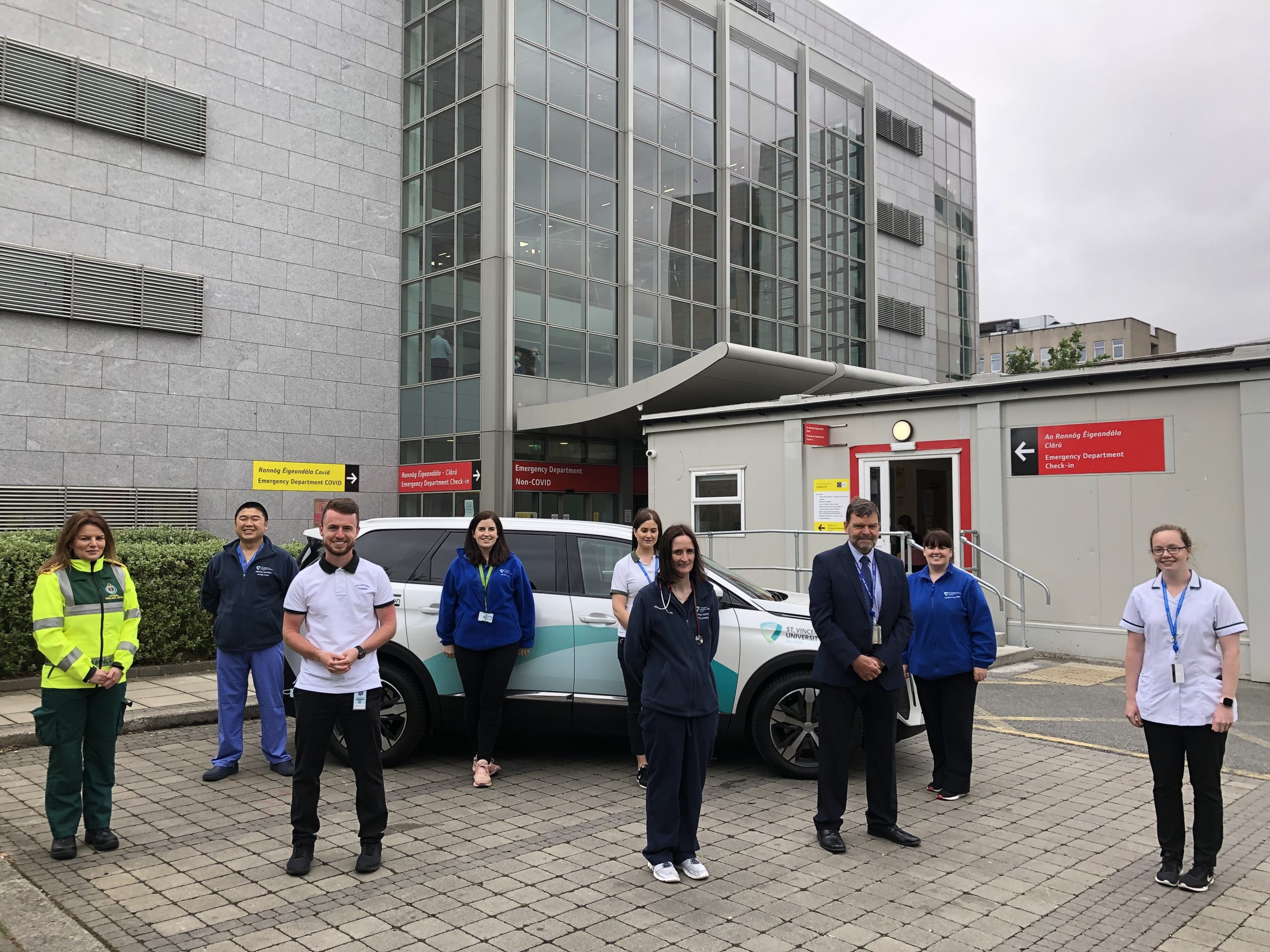EDITH Brings the Emergency Department to Frail Older Adults at Home
Since starting in early 2020, EDITH has been hugely successful in providing emergency care to people in their homes and preventing unneeded ED visits.
Go to Original ResearchThe Hospital
Saint Vincent’s University Hospital, Elm Park, Nutley Lane, Dublin 4.
There are over 60,000 annual attendances to St. Vincent’s University Hospital’s (SVUH) Emergency Department (ED); 49% of these are aged 65 or over, and 14% are aged 75 or over. SVUH has a large mixed urban and rural catchment area with a high number of Nursing Homes within this.
The Need
The traditional model of emergency care involves patients being transferred to the ED to be assessed and this can be associated with elevated risks. There was a clear need for our ED care to diversify in order to meet the needs of the service and for those attending it. Emergency Department in the Home (EDITH) responds to unscheduled care in an innovative way by assessing the patient in their home environment.
 EDITH team members ready to bring emergency department services to vulnerable older adults at home.
EDITH team members ready to bring emergency department services to vulnerable older adults at home.
The Improvement: What is EDITH?
Emergency Department in the Home (EDITH) is a frailty response service, providing emergency medical and occupational therapy input to adults aged 65 and over in the SVUH catchment area. EDITH was established to provide a patient-centred approach to ED care, also with the aim of reducing unnecessary ED attendances. Subsequently, this would allow ED resources to be redistributed and to release bed days back into the SVUH healthcare system. EDITH runs as a seven day service with one Emergency Registrar / Consultant or Advanced Nurse Practitioner (ANP) and one Occupational Therapist each shift.
EDITH accepts referrals from local General Practitioners (GPs) and other community-based HCP’s through a geriatrician hotline. Referrals are also accepted from Nursing Homes, the National Ambulance Service (NAS), and from our ED team. Referrals received can be related, but not limited to, falls, delirium, wound reviews, pain management, infections, functional decline or catheter-related issues. All accepted patients receive a once-off visit, however many patients will then be referred or sign-posted to relevant community services. These include; community Occupational Therapy, community Physiotherapy, Public Health Nurses, Geriatrician assessment hubs, community palliative medicine etc. Where EDITH identify that it is not in the patient’s best interest to remain at home (from either a medical or functional perspective), they are referred to either our ED department, an alternative Medical Assessment Unit (MAU), or to local rehabilitation/reablement facilities as appropriate.
Challenges and Successes
EDITH began in February 2020 and since then it continues to evolve and review its practices. As EDITH is the first of its kind in Ireland, it is difficult to benchmark standards and service delivery. This however, has allowed EDITH to establish its own identity and to create a service that has filled a gap in providing effective emergency care within our hospital group.
EDITH accepts a wide variety of referrals (as detailed above), which can make it difficult to streamline referrals. Cases are prioritised on a daily basis but as the nature of the service is emergency-care, a patient’s priority level may fluctuate throughout a day if higher priority referrals are received. This is a challenging aspect of unscheduled care.
EDITH has been hugely successful in treating patient’s effectively within their own homes. Between 20/02/20 and 09/09/21, EDITH have treated 3137 patients, with 2909 of these patients remaining at home while 228 patients were transferred to hospital. This gives a conveyance rate of 7.2%, with the average conveyance rate since its inception being under 10%. The EDITH service has saved the hospital 7.9 years of bed days (2909 bed days) as these patients have not presented to the emergency department.
Three hundred and thirty six patients have been referred to primary care or day hospital services; this ensures continuity of care and enables relevant supports to be put in place, which also contributes to admission avoidance.
There is a growing body of evidence highlighting the detrimental impact a hospitalisation can have on an older adult (Mudge et al, 2019). There is a clear need for health care services to diversify in order to meet the needs of this ageing population. EDITH is leading this change in Irish healthcare by providing specialised emergency care and Occupational Therapy intervention for the older adult in their own homes.
Outcomes
EDITH continues to build on its successes; implementing alternative care pathways for the older adult population, reducing unnecessary ED attendances, releasing bed days for those that need them, and linking older adults into community services that can contribute to prolonged independence at home. EDITH is the first service in Ireland to provide joint targeted emergency medical and occupational therapy assessment within patients’ homes. EDITH has had an extremely positive impact on the provision of emergency care within our hospital, and hopes to pave the way for other emergency care services in Ireland in doing so.
Authors
- Cliona Doyle, Senior Occupational Therapist
- Dr. Rosa McNamara, Consultant in Emergency Medicine
- Aidan Delaney, Senior Occupational Therapist
- Aisling Davis, Clinical Specialist Occupational Therapist
- Alison Sweeney, Senior Occupational Therapist
- Laura Kenny, Advanced Nurse Practitioner Care of the Older Person
The authors of this article are some of the creators and operational team members responsible for the EDITH program in Dublin, Ireland.
References
- McNamara et al (2020). Community frailty response service: the ED at your front door. EmergencyMedicine Journal. 37(11). https://emj.bmj.com/content/37/11/714
- Mudge et al (2019). Hospital-Associated Complications of Older People: A Proposed Multicomponent Outcome for Acute Care. Journal of the American Geriatrics Society. 67(2) https://pubmed.ncbi.nlm.nih.gov/30423197/